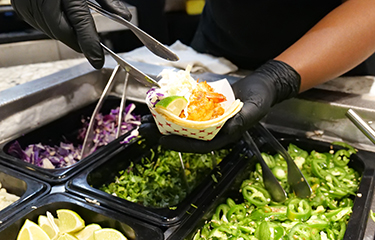SeafoodSource is closely following the sustainable seafood movement by compiling a regular round-up of sector updates about sustainability initiatives and certifications.
-Philadelphia, Pennsylvania U.S.A.-based Aramark Collegiate Hospitality has established a culinary partnership with Audubon Nature Institute’s Gulf United for Lasting Fisheries (G.U.L.F.) sustainable seafood program.
The program will ensure education for chefs on sustainable sourcing practices from the Gulf of Mexico, and promote seafood sustainability in culinary endeavors, G.U.L.F. said.
“Seafood is a huge part of the culinary landscape and when you look around you begin to realize, as a chef, just how much of an impact we have on that landscape, on our carbon footprint. Once you dive in, you quickly see the ripple effect of the impact we can make,” Aramark Regional Culinary Director Ben Hernandez said in a release. “This partnership with Audubon Nature Institute has opened up doors of education, knowledge, and empowerment to do what’s right for the ecosystem directly around us. Working in a Collegiate Hospitality environment, we have the opportunity to bring this full circle and share this knowledge directly with our students who will soon be the next generation of consumers."
- The International Fishmeal and Fish Oil Organization (IFFO) announced it will be holding the sixth annual IFFO Marine Ingredients China Workshop, the world’s largest fishmeal user workshop, on 12 December. The event will take place in Guangzhou, the capital city of Guangdong province in Southern China.
“China is the world’s largest user of fishmeal. The workshop will focus on the global marine ingredients market, production and consumption in Vietnam, Europe, and Chile, and regulations and standards on imported feed in China, fishmeal/fish oil application, and China fishmeal demand,” IFFO China Director Maggie Xu said in a release.
-On 6 November, chemical manufacturing company DSM-Firmenich announced a partnership with London, England-based software development company Sustained.
The two will be joining forces to partner on farm-to-fork environmental reporting on food products to expand consumer transparency.
The partnership will allow for further reporting on the environmental footprint of food products containing fish, eggs, poultry, and more.
“Until recently, full Life Cycle Assessment (LCA) for farm and food products has been an expensive, manual effort that exceeded the resource capacity of firms with hundreds or thousands of SKUs. With this partnership we make data management from farm to fork easier to manage and maintain at scale, bringing greater transparency that empowers more sustainable food production and consumption,” Sustained CEO and Co-Founder Carl Olivier said in a release.
-On 7 November, the Global Sustainable Seafood Initiative (GSSI) announced it has recognized the Best Aquaculture Practices (BAP) program under its 2.0 Global Benchmark Tool, GSSI announced in a release.
BAP received its first recognition from GSSI in 2017, and the organization has now succesfully rebenchmarked its BAP Farm Standard (version 3.0, 2021), Salmon Farms Standard (version 2.3, 2016), and Mollusk Farms Standard (version 1.1, 2021).
Photo courtesy of Aramark Collegiate Hospitality







